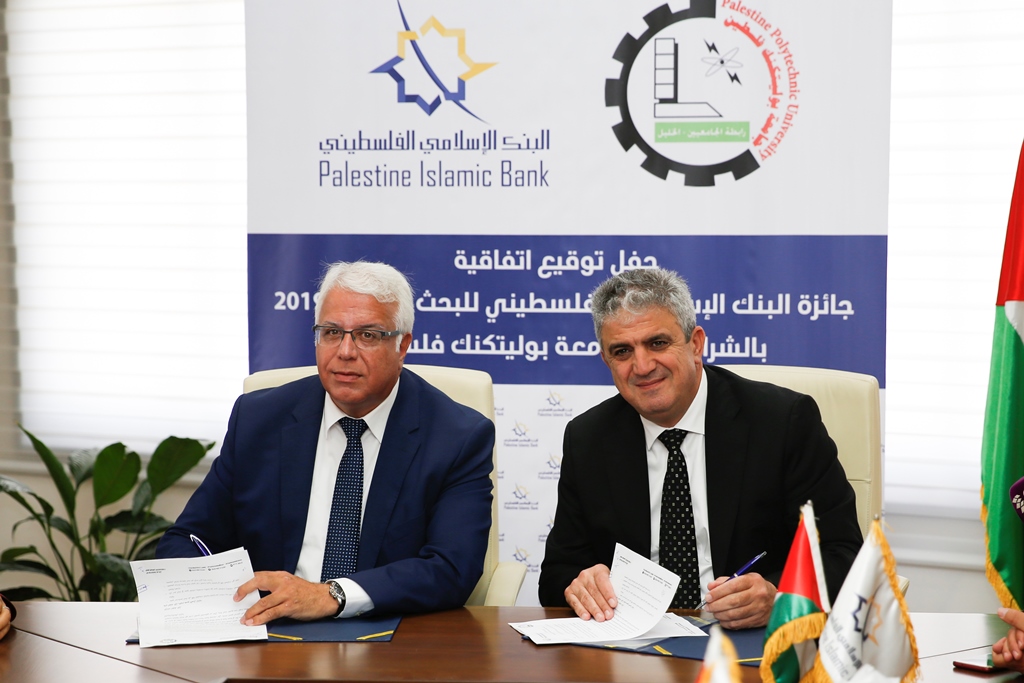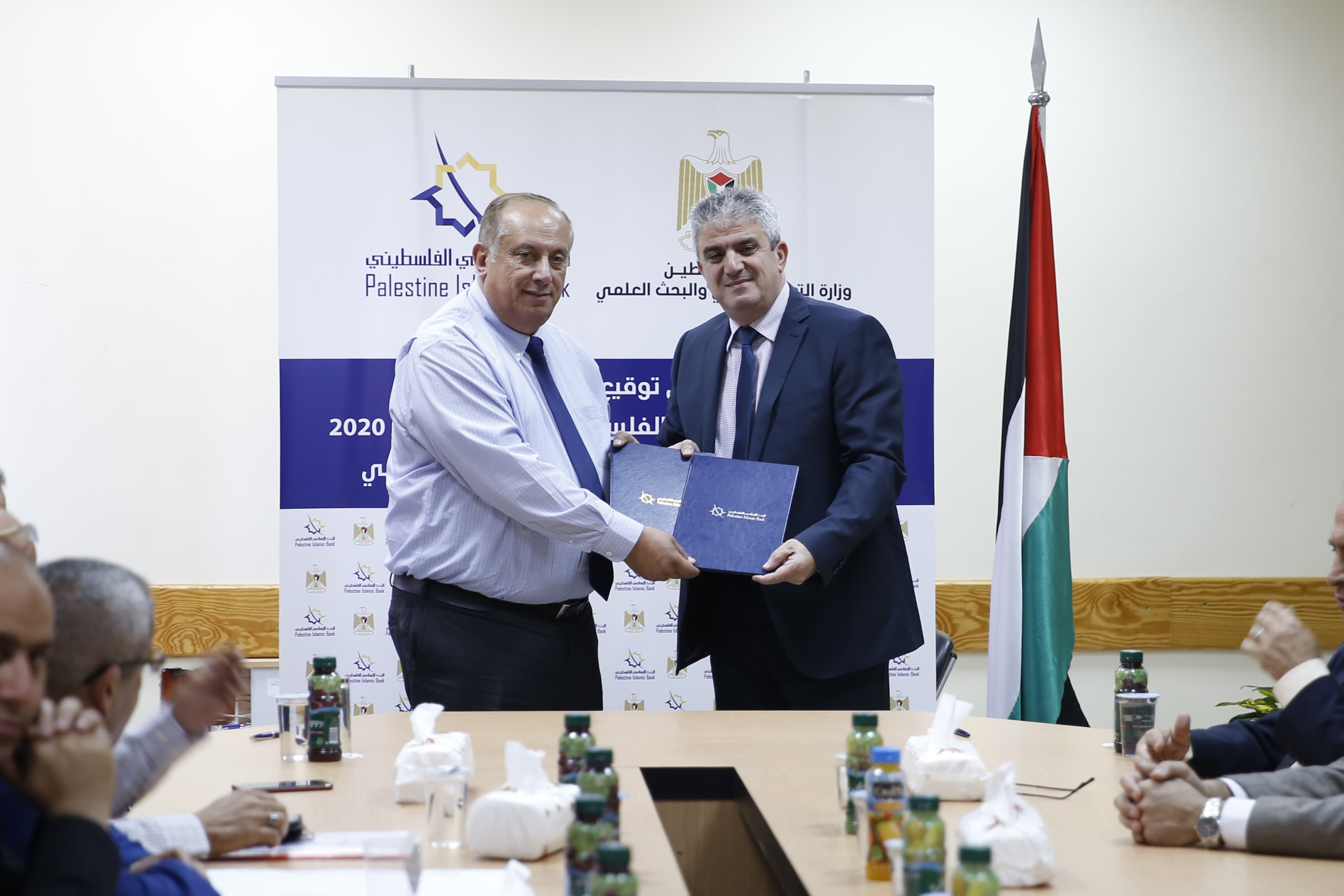
Islamic Sharia sets the basis and starting point for the actions, policies and orientations of the Palestine Islamic Bank, and the Bank is committed to complying with its objectives which seek to help and assist others and play an active role in society, with the aim of building a strong homeland and looking for the good results promised by God. Allah The Almighty says, "The Believers, men and women, are protectors of one another: they enjoin what is just and forbid what is evil: they observe regular prayers, practice regular charity, and obey Allah and His Messenger. On them will Allah pour His mercy: for Allah is exalted in power, Wise" Surah AlTawbah: Verse 41.
The Bank’s social responsibility strategy is based on creating a positive and sustainable impact through the support it provides. In line with this strategy, its plan aims to implement projects that focus on vital sectors such as health and education, including supporting educational institutions and encouraging scientific research. This constitutes a basis for achieving sustainable development, in addition, to supporting vulnerable groups and improving their living conditions.
The Bank believes that investing in individuals is a cornerstone for achieving development. It, therefore, supports the education at all stages and at various levels, and has provided its support to dozens of educational institutions in many parts of the country.
To improve the quality of education, the Bank has supported the infrastructure of educational institutions. It signed an agreement with the Economic Cooperation Foundation with the aim of establishing classrooms in Noor Al-Quds School in Jerusalem, paying the installments of students in need in Al-Aqsa Islamic schools and nurseries in Jerusalem, supporting the association of UNRWA staff in the Gaza Strip, and providing the needs of dozens of schools in the various governorates of the country by installing solar-based energy production units. This is in addition to installing umbrellas to protect students from the weather, providing stationery and display equipment, developing multi-purpose rooms and school computer labs, rehabilitating some classes and health facilities, and providing operating expenses for other schools.
The Palestine Islamic Bank's interest in developing minds goes hand in hand with its dedication to providing care. The Bank has dedicated a large part of its social responsibility budget to supporting the health sector. It has continued its support of the blood bank in the West Bank, the Palestinian Red Crescent Society in Nablus and the Palestinian Foot Care Center, in addition to supporting a number of medical centers, especially in marginalized areas.
In order to help and support cancer patients, the Bank has covered the costs of the transportation of cancer patients from the Gaza Strip to West Bank hospitals and also within the areas. It has supported training for 60 women cancer patients in Gaza with the aim of empowering them economically. This is in addition to supporting cancer institutions in Hebron.
Besides the projects implemented by the Bank to support the health and education sectors, whose development is essential to achieving sustainable development, the Bank has supported more than 18 local bodies and development institutions, to help them with developing and upgrading the services they provide to citizens.
The Bank has dozens of effective partnerships with national institutions specializing in health, education, sports, development and relief, and provides support to empower Jerusalemites through the Fajer Al-Quds Organization.
In continuation of the Bank’s efforts to support deprived regions, especially in the Gaza Strip, it launched a project to establish 8 water desalination plants in different parts of the area, 5 of them have been completed, while the remaining plants are expected to be finished at the beginning of 2020.These plants are part of the Bank’s efforts to achieve sustainable development by fulfilling community needs and provide decent living conditions for all members of society.
As part of its efforts to build effective partnerships with other sectors, the Bank supported the construction of a carpentry workshop for the National Security Forces in Nablus. This workshop is used to produce furniture for needy families benefiting from charitable and relief projects implemented by the Scientific Committee of the National Security Forces.
In compliance what Prophet Muhammad peace be upon him said: "The similitude of believers in regard to mutual love, affection, fellow-feeling is that of one body; when any limb of it aches, the whole body aches, because of sleeplessness and fever.", the Bank in collaboration with the Scientific Committee of the National Security Forces and Al-Khair Foundation renovated two houses for families in Hebron and Qalqilya, providing the children of the two families with a safe environment and a positive atmosphere. It also supported a family of six, in which the parents suffer from chronic diseases, in order to provide an income that guarantees a decent life for the family.
During the month of Ramadan, the Bank launched the "Fasting Iftar" project, which provided more than 3,000 Iftar meals to needy families.
The Bank considers providing support for people with special needs among the priorities of its social responsibility program. It continued its support to the institutions which offer help to those with special needs in various governorates, in order to enable these institutions to develop the services provided to them, help them achieve their ambitions and enhance their integration into society.
The Bank also provided a number of electric wheelchairs for people with disabilities in Ramallah and Al-Bireh Governorates and provided an adapted vehicle in the Hebron Governorate.
The Bank aims to ensure those with special needs can benefit from the products and services it offers. It has introduced sign language for banking transactions, withdrawal and deposit vouchers in Braille and has adapted the entrances of its branches to suit those with disabilities.
As part of its continuous efforts to support sustainable development, the Palestine Islamic Bank was the first Palestinian Islamic institution to join the UN Global Compact. The Global Compact is one of the initiatives launched by the United Nations to encourage companies worldwide to adopt sustainable and socially responsible policies, through aligning their operations and strategies according to several principles that are internationally acceptable in the areas of human rights, work, the environment and anti-corruption. This compact is also considered the largest sustainability initiative with the participation of more than 13,000 entities around the world.
Joining this Compact demonstrated the Bank’s commitment to implementing best practices in sustainability and environmental protection and the improvement of living conditions of community members, as well as other aspects of the Compact. The Bank believes in its ability to create an important, positive impact in this field by constantly developing its policies and programs and integrating the concept of sustainability in all its activities, alongside other policies it has pursued over the years with regard to improving and protecting the environment. This will be achieved through increased dependence on clean energy and digitization.
The Bank’s approach to supporting the education sector was not limited to providing support to educational institutions. It also supports scientific research efforts in Palestine, which is an essential path to achieving sustainable development. The Bank sponsored an award for Scientific Research, the PIB Scientific Research award, in cooperation with Palestine Polytechnic University for the fifth year in a row. The award is supervised by a scientific research committee from Palestinian universities that set specific standards and conditions for receiving applications for those wishing to compete for the award.

The award consists of six categories and is awarded to those who produce outstanding scientific or technical research, which has been published in recognized international scientific journals. The first three categories are as follows:
As for the other three categories, they are awarded at the Palestine Polytechnic University level as follows:
Additionally, the Bank signed a cooperation agreement to support scientific research with the Ministry of Higher Education and Scientific Research that includes the launch of the "Palestine Islamic Bank Award for Scientific Research 2020", which the Ministry will organize and supervise. This is in addition to organizing a group of workshops to encourage scientific research and provide researchers with the skills required in this field, by specialists chosen by the Ministry of Higher Education and Scientific Research. The agreement will encourage researchers to develop their research and apply it to aspects of economic and social life, to form a scientific basis for progress in sustainable

Since 2014, the Bank has increasingly relied on clean energy sources to obtain the energy needed to perform its activities, to help preserve and care for the environment. Allah The Almighty says: "Do no mischief on the earth, after it hath been set in order, but call on Him with fear and longing (in your hearts): for the Mercy of Allah is (always) near to those who do good" Surah Al-A'raf: Verse 56.
The impact of the Bank’s environmental policies in one year has been to plant the equivalent of 500 acres of trees (2,100 dunums).
The Bank protects the environment in six key ways:
The number of sites which benefit from the Bank’s solar energy system increased to 15 branches and offices. The productivity rate of these sites is 1.6 megawatts of electricity per day, equivalent to 600 megawatts of electricity annually, which provides an environment free of the carbon dioxide emissions, which result from the use of generators. Annual harmful gas emissions that were avoided due to the use of alternative energy were estimated as follow:
The Bank plans to maximize the benefits of clean energy and increase its production, in innovative ways that contribute to improving the environment.
The Bank’s social responsibility was not limited to providing financial support. It encourages its employees to participate in volunteering activities, and to spend one day per year volunteering.
The Bank employees participated in several volunteering activities, most notably during the blessed month of Ramadan, as part of the "Iftar Project" providing Iftar meals to more than 3,000 families living in very difficult circumstances in the Gaza Strip, Jerusalem, Hebron, and Nablus.
The volunteering activities of the Bank's employees were not limited to the holy month of Ramadan. Employees in the northern region volunteered in Salfit governorate, cleaning public places and planting trees at the martyr Yasser Arafat's hospital and its surroundings.